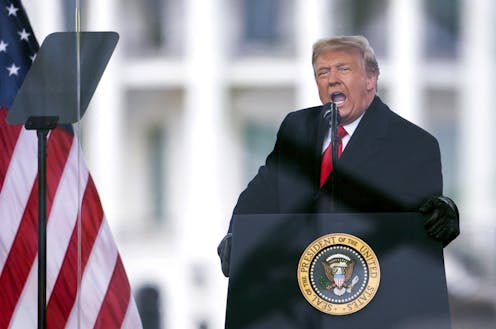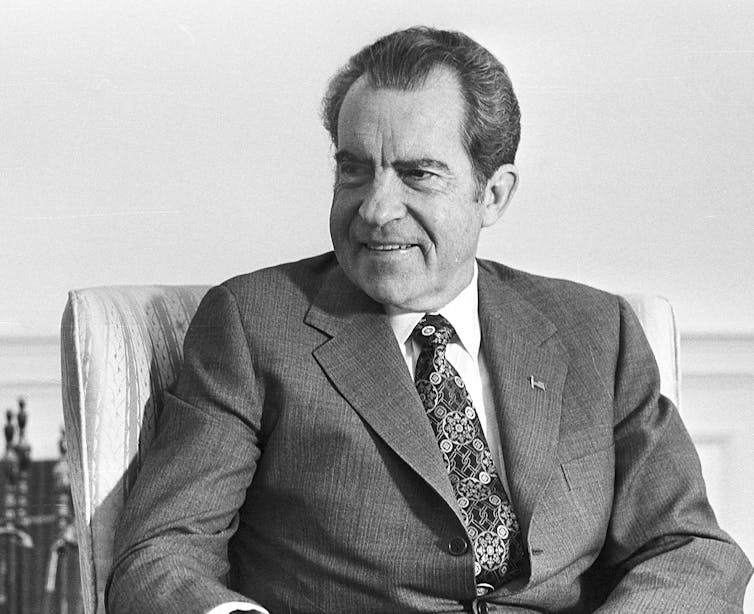
The Supreme Court’s decision that grants presidents immunity from criminal prosecution for their “official acts” has been met by alarm by many legal scholars. Constitutional lawyer Michael Waldman referred to the decision as an “instruction manual for lawbreaking presidents,” while law professor Michael Dorf noted that the ruling would seemingly allow a president to openly sell pardons for bribes.
As a political philosopher whose work focuses on how political institutions are preserved, I am concerned about these implications of the court’s decision. I am, however, also worried about what the effects would be of the absence of such immunity.
Complexities of presidential prosecutions
The Supreme Court declared over 40 years ago that presidents are immune from civil liability for official acts. In the 1982 case Nixon v. Fitzgerald, the court determined that presidents cannot be sued for their official acts. The judges noted that allowing such lawsuits would “distract a president from his official duties,” to the detriment of the American polity itself.
These concerns seem to apply as easily to criminal prosecution as to civil liability. If responding to a lawsuit would make it more difficult for presidents to perform their job, so too could a criminal indictment.
In the present deeply partisan political world, such concerns become even more important. Whether or not one approves of the actions of Donald Trump, it is worth noting that what is done to one president could be done to others. Indictments might sometimes reflect partisan politics; they may, more often, be interpreted as politically motivated, thereby inflaming such partisanship.
These worries are demonstrated in some recent international examples. Many countries have recently prosecuted former leaders for acts undertaken in office. These include France, which recently convicted former President Nicolas Sarkozy for violations of campaign finance rules; and Israel, which has indicted current President Benjamin Netanyahu on corruption charges.
There have been positive and negative effects of such prosecutions. Political scientist Victor Menaldo notes that such prosecutions have sometimes led to cynicism about the impartiality of the legal system; they have also brought about a retrenchment of public support for authoritarian rule – and, in some cases, they have even been used by prosecuted leaders to buttress their political support. Leaders in Kenya and Brazil, for example, both returned to power after incarceration.
Additionally, Menaldo’s work has shown that such prosecutions have sometimes worsened political polarization. Concerned about the threat of future prosecutions, presidents have sometimes led assaults on the independence of the legal system – as Netanyahu has done since his own indictment.
It seems that any vision of presidential immunity comes with its own risks. So how can we think about the nature and limits of such immunity?
Presidents and the demands of virtue
One might ask, instead, a prior question: What might bind a president to the norms and rules of the law, short of a threat of criminal punishment?
A dominant theme in much political philosophy is the need for citizens to voluntarily act to uphold the norms and institutions that make up their political system. Philosopher John Rawls, for one, emphasized that societies can persist only if their citizens accept a moral duty to preserve and uphold the institutions of that society. Modern political philosopher Anna Stilz echoes these thoughts, arguing that anyone concerned with human rights ought to show loyalty to those political institutions without which human rights cannot exist.

The same is true of presidents. Since the time of Aristotle, philosophers have argued that political leaders are required to demonstrate particular political virtues. Chief among those is the willingness to prefer public success over private gain. The good leader helped others develop their potential – he did not simply pursue what was advantageous to himself.
Most presidents have had some occasion to demonstrate such habits of character. Richard Nixon, for example, was urged by his staff to simply ignore the Supreme Court ruling that told him to hand over the recordings he had made. His staff said, in essence, that the president could insist upon his authority as equal to that of the Supreme Court, even if that undermined the balance of powers between the executive and the judicial branches. Nixon disagreed with his staff and chose to resign rather than undermine the system itself.
What this means, though, is that the most effective guarantee against presidential lawbreaking has been, for over 200 years, the presidential belief that the law – and the system that produces such law – is worth taking seriously. Most presidents have tried with more or less success to preserve the norms and rules that constitute the political system itself.
The best defense against wrongful presidential acts may be the election of presidents who are virtuous enough to not do them or to resist the temptation to do such acts.
Michael Blake receives funding from the National Endowment for the Humanities.
This article was originally published on The Conversation. Read the original article.







